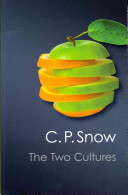Why is Scientific Illiteracy Considered Acceptable?
A good many times I have been present at gatherings of people who, by the standards of the traditional culture, are thought highly educated and who have with considerable gusto been expressing their incredulity at the illiteracy of scientists. Once or twice I have been provoked and have asked the company how many of them could describe the Second Law of Thermodynamics. The response was cold: it was also negative. Yet I was asking something which is about the scientific equivalent of: Have you read a work of Shakespeare's?
I now believe that if I had asked an even simpler question—such as, "What do you mean by mass, or acceleration," which is the scientific equivalent of saying, "Can you read?"—not more than one in ten of the highly educated would have felt that I was speaking the same language. So the great edifice of modern physics goes up, and the much insight into it as their neolithic ancestors would have had.^^ much insight into it as their neolithic ancestors would have had.^^
Notes:
When failing to read Shakespeare is considered unacceptable?
Folksonomies: literacy two cultures illiteracy
Taxonomies:
/society/work/unemployment (0.577105)
/art and entertainment/theatre (0.564922)
/art and entertainment/movies and tv/comedies (0.410976)
Keywords:
Illiteracy Considered Acceptable (0.984996 (neutral:0.000000)), neolithic ancestors (0.784226 (positive:0.338048)), scientific equivalent (0.754279 (negative:-0.253326)), considerable gusto (0.634460 (positive:0.484325)), great edifice (0.583310 (positive:0.635742)), good many times (0.577032 (positive:0.329493)), traditional culture (0.574412 (positive:0.340013)), simpler question—such (0.569468 (neutral:0.000000)), modern physics (0.549543 (positive:0.635742)), Shakespeare (0.434901 (negative:-0.575095)), insight (0.408310 (positive:0.338048)), incredulity (0.395206 (positive:0.484325)), Thermodynamics (0.369852 (negative:-0.476191)), gatherings (0.366296 (positive:0.329493)), acceleration (0.363213 (neutral:0.000000)), response (0.352104 (negative:-0.311190)), people (0.351247 (positive:0.329493)), standards (0.351112 (positive:0.340013)), company (0.351064 (negative:-0.476191)), Law (0.350815 (negative:-0.476191)), scientists (0.350462 (positive:0.484325)), work (0.347649 (negative:-0.304601)), mass (0.345871 (neutral:0.000000))
Entities:
Shakespeare:Person (0.950011 (negative:-0.575095)), Second Law of Thermodynamics:PrintMedia (0.838760 (negative:-0.476191))
Concepts:
Physics (0.960071): dbpedia | freebase | opencyc
Thermodynamics (0.751715): dbpedia | freebase
Sentence (0.728970): dbpedia | freebase | yago
Entropy (0.707693): dbpedia | freebase
Temperature (0.669873): dbpedia | freebase | opencyc
Second law of thermodynamics (0.622151): dbpedia | freebase
Laws of thermodynamics (0.618754): dbpedia | freebase
Time (0.595647): dbpedia | freebase | opencyc






